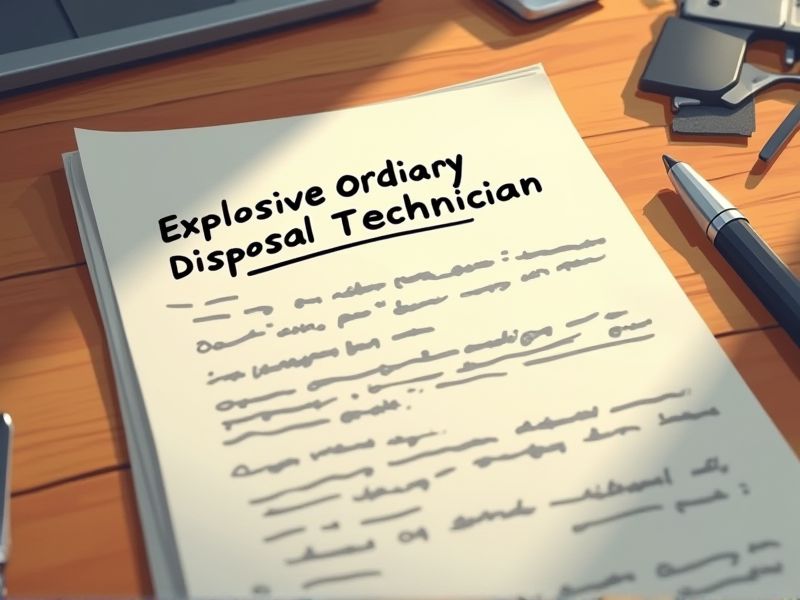
Explosive Ordnance Disposal Technicians face complex and dangerous tasks that require specialized expertise to ensure safety and efficiency in their operations. Achieving certain certifications equips these professionals with the knowledge and skills necessary to handle explosive threats and mitigate risks. Certified training enhances their capability to operate in high-pressure environments with precision and confidence. Some important certifications you may need for an Explosive Ordnance Disposal Technician are listed below.
Explosive Ordnance Disposal (EOD) Technician Level I Certification
Explosive Ordnance Disposal (EOD) Technician Level I Certification is crucial as it ensures that technicians possess foundational skills in safely handling and disarming explosives. Certification reduces the risk of mishandling, which can lead to accidents and fatalities. It also standardizes procedures across different operations, promoting uniformity and improving coordination during joint missions. Armed forces and law enforcement require this certification to trust that their technicians can effectively neutralize explosive threats in various scenarios.
Explosive Ordnance Disposal (EOD) Technician Level II Certification
EOD Technician Level II Certification is needed because it ensures proficiency in handling advanced explosive devices and their safe defusal. Without this certification, technicians may lack the necessary skills to accurately assess and mitigate high-risk explosive threats. Certification provides standardized training that equips technicians with advanced tools and techniques necessary for modern explosive ordnance disposal. It also signifies competence recognized by military and civilian agencies, ensuring operational readiness and collaboration across sectors.
Military EOD Qualification Certification
The Military EOD Qualification Certification is needed because it provides standardized training crucial for safely handling explosive devices, which ensures technicians have the skills to neutralize potential threats. Without this certification, there would be increased risks of accidents, endangering both the technician and the public. The certification process also equips technicians with knowledge on the latest technologies and strategies in explosive ordinance disposal, which is crucial for adapting to evolving threats. Proper certification maintenance guarantees adherence to military regulations and procedures, enhancing operational readiness and effectiveness.
CBRNE Specialist Certification
Explosive Ordnance Disposal Technicians often operate in environments where chemical, biological, radiological, nuclear, and explosive (CBRNE) threats coexist, requiring a comprehensive understanding beyond explosives alone. CBRNE Specialist Certification equips these technicians with the necessary knowledge to identify, assess, and mitigate non-conventional threats effectively. This certification enhances their capabilities in handling a wide array of hazardous materials, ensuring they can respond to diverse situations safely. By obtaining this certification, technicians demonstrate proficiency in current protocols and technologies essential for maintaining public safety and operational readiness.
Bomb Suit Operator Certification
Bomb Suit Operator Certification ensures that Explosive Ordnance Disposal (EOD) Technicians have standardized training to safely handle explosive devices. A certified technician is more likely to adeptly use protective gear, reducing the risk of injury during bomb disposal operations. This certification enhances the credibility and reliability of technicians in high-stakes, life-threatening situations. Certification requirements often reflect updated safety protocols and technological advancements in bomb disposal equipment.
Hazardous Materials Technician Certification
The Hazardous Materials Technician Certification is required for Explosive Ordnance Disposal (EOD) Technicians due to the need for expertise in handling dangerous substances safely. EOD operations often involve dealing with chemical, biological, or radiological materials, and certified technicians possess the necessary skills to manage these threats. Certification ensures that EOD Technicians understand proper containment, neutralization, and disposal processes to mitigate risks effectively. Regulatory compliance and enhanced safety protocols in hazardous conditions are achieved through this certification, allowing operations to proceed with minimized environmental and human health impacts.
Advanced Explosive Ordnance Disposal Course Certification
The Advanced Explosive Ordnance Disposal Course Certification ensures technicians gain comprehensive knowledge of sophisticated explosive devices. Specialized training from the course elevates a technician's ability to handle complex scenarios with precision and reduced risk. Knowledge from the certification reassures military and civilian entities of enhanced safety measures in explosive management. Skills gained enhance operational effectiveness in both field and strategic planning situations.
Counter-IED Operations Certification
Counter-IED Operations Certification is essential for Explosive Ordnance Disposal (EOD) technicians because it enhances their ability to identify and neutralize improvised explosive devices, reducing risk to personnel and civilians. This certification ensures that technicians are updated with the latest techniques and technologies, increasing the overall success rate of disposal missions. Without such certification, technicians may lack crucial skills and knowledge, leading to potential operational failures. Certification also provides a standardized benchmark, ensuring consistency and reliability across different operations and units.
OSHA HAZWOPER Certification
The nature of explosive ordinance disposal (EOD) involves handling hazardous materials, making OSHA HAZWOPER certification crucial for ensuring technicians' safety. Certification provides comprehensive training on managing and disposing of hazardous substances, reducing the risk of accidents. EOD technicians frequently work in environments with potential chemical exposure, necessitating a thorough understanding of safety protocols covered in HAZWOPER training. Compliance with OSHA standards through certification helps organizations avoid legal penalties while ensuring a safe working environment.
Incident Command System (ICS) Certification
Explosive Ordnance Disposal Technicians work in high-risk environments where efficient coordination and communication are crucial for safety. ICS Certification equips them with structured incident management skills, enhancing their ability to operate effectively under pressure. It ensures that they can seamlessly integrate with other emergency response teams during joint operations. This certification also standardizes the procedures, minimizing confusion and optimizing resource deployment in critical situations.
Summary
When you become certified as an Explosive Ordnance Disposal (EOD) Technician, you enhance your technical expertise and safety protocols. The certifications often lead to improved decision-making skills and advanced threat analysis abilities. Employers tend to prefer certified technicians, increasing your job opportunities and career advancement. Your credibility and trustworthiness in high-stakes environments are significantly boosted.
